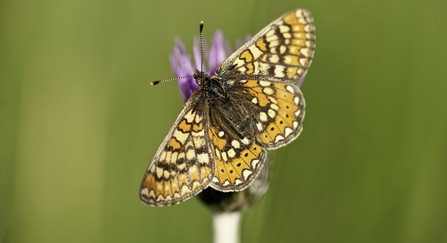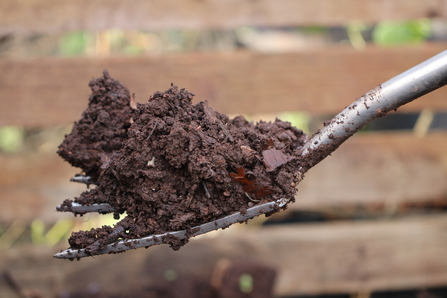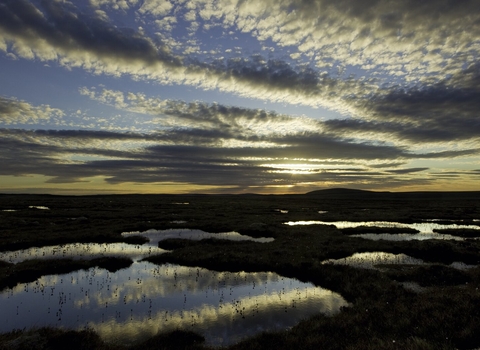What are peatlands?
Peatlands are found across the world, from Cornish valley marshes and bogs on Bodmin Moor to tropical swamps and artic mires. These are wetlands formed over thousands of years, where waterlogged conditions mean dead plants are unable to fully rot down and that instead of their carbon being released into the atmosphere through decomposition, it is trapped as peat: a build-up of partially decomposed mosses and plants.

Ross Hoddinott/2020VISION
Why are peatlands important?
Peatland habitats are havens for wildlife and truly spectacular places to visit. They are bursting with wildlife from carnivorous plants such as the alien-like sundew to rare butterflies, like marsh fritillary and birds including curlew and golden plover.
Peat forms incredibly slowly, accumulating on average only 1mm a year, taking 1000 years to form 1 metre of peat! Peatlands act like sponges reducing the risk of droughts and floods; they help provide us with clean drinking water too.
Find out more about peatlands on The Wild Cornwall Podcast.
Peatlands only cover 3% of the world’s surface but they store nearly 30% of our soil carbon globally.
Peatlands and carbon dioxide absorption
Healthy peatlands absorb carbon dioxide from the atmosphere, storing more carbon across the world than any other habitat on land. Most importantly, peatlands can continue absorbing carbon indefinitely and hold on to it for millennia - provided they are undisturbed. Human activities like draining, burning and peat harvesting (for fuel or gardening) have left over 80% of UK peatlands in a poor state causing them to release more carbon dioxide into the atmosphere than they absorb. As peatlands dry out and lose the waterlogged conditions necessary to form peat and absorb carbon, they also lose the ability to store it.
The impact of damaged peatlands
Damaged peatlands become a major source of greenhouse gas emissions, estimated to account for 5% of the UK’s total carbon emissions.
Peat forms really slowly, around 1mm a year, though commercial extraction, for products like peat compost, is capable of removing 500 years’ growth annually, therefore much like fossil fuels, our use of peat, is unsustainable. Thankfully our government is finally recognising the importance of peatlands, pledging £50 million towards peatland restoration, and making plans to end the sale of peat products by 2024.
UK peatlands hold 3 times as much carbon as all our woodlands put together.
What are the impacts if we wait until the proposed government peat ban in 2024?
According to recent analysis, waiting until 2024 to ban peat use could add more than 1.5 million tonnes of CO2 to our atmosphere (roughly equivalent to the annual greenhouse gas emissions of more than 214,000 UK residents) while further contributing to species and habitat decline. Bringing about an end to all uses of peat is an obvious step that UK Governments can take to put nature into recovery and transform peatlands from carbon emitters into carbon sinks.
Can degraded and damaged peatlands be restored to help?
Restoring degraded peatlands so that they can once again absorb and hold on to carbon has a vital role to play in our fight against climate change, and it’s another example of how working with nature is important for us all. Peatland restoration involves re-wetting to reinstate the waterlogged conditions required for peat to form, so that these previously degraded habitats stop releasing carbon, and begin once again to capture and store it, combatting climate change whilst providing fantastic habitat for all manner of species from bog bean and bog asphodel to the dainty small red damselfly.
A Cornwall Wildlife Trust case study
Work has recently started on the restoration of 17 hectares of peatland in the top f the Drift catchment. Stephen Bone, a farmer we have been working with through the Upstream Thinking Project for over 10 years, has given us the green light to rewet an area of peatland in west Penwith. Rewettting here is done through careful installation of peat and wood blocks in old drains and ditches funded by Defra through the South West Peatlands Partnership.
Where can I buy peat free compost?
Please see the list below which will be updating throughout the year. Before making a purchased, check the details on shop-bought compost carefully to make sure it is 100% peat-free – the labelling is not always easy to interpret.
Peat-free plant nurseries are listed here.
|
Retailer and peat-free target |
Peat-free composts |
Peat-free plants |
|
Local - Trevisker Garden Centre, Padstow Entirely peat free |
All compost peat-free and refill service available |
Peat free growing since 2018 |
|
Local - Cornwall Green Waste |
Available direct from the company in bulk. |
|
|
RHS RHS compost sales have been peat-free since 2020. |
All composts sold by RHS are peat- free. |
The charity are working with suppliers to eradicate peat use in the plants they sell, so that sales will be peat-free by 2025. |
|
Travis Perkins Plans to go 100% peat-free this year. |
Travis Perkins sell Supagrow Peat-free multipurpose compost 50L. |
Travis Perkins do not sell plants. |
|
Co-op Co-op only stocks peat-free compost. |
Co-op sells Westland's New Horizon peat-Free compost at over 1,100 of its stores and forecourts. |
|
|
Dobbies |
All of compost Dobbies now sells is peat free. |
Dobbies sell a selection of peat-free houseplants, ornamental & fruit trees, shrubs, pot- grown Christmas trees, and perennials. |
|
B&Q The company has announced a commitment to being 100% peat-free across its bagged growing media in 2023. |
B&Q sell a range of peat-free composts. |
In 2014 B&Q introduced a range of bedding plants that are 100% peat-free. |
|
Wickes Plans to phase out peat sales by 2025. |
Westland New Horizon All Plant Compost in 50L / 60L Wickes Multi-purpose Peat-free Compost 50L |
Wickes do not currently stock peat-free plants. |
|
Asda Plans to phase out peat sales but no end date given. They plan to remove peat from own-brand products by 2030. |
Asda stock their own-brand Asda Peat Free Compost (50L). |
Asda stock a range of peat-free container and houseplants. |
|
Homebase Plans to phase out peat sales but no end date given. |
Homebase sell their own-brand Homebase peat-free Compost 50L, as well as a range of New Horizon products: New Horizon All Plant Compost 20L / 50L New Horizon Vegetable Growing Compost 50L New Horizon Tomato Planter |
Homebase did not state that they sell peat-free plants. |
|
Lidl Plans to phase out peat sales but no end date given. |
They offer a 20L peat-free multi-purpose compost. |
Lidl did not state that they sell peat-free plants. |

Practical action you can take right now
- Pledge to go peat-free!
- Only buy peat free compost and plants
- Use this letter template from forpeatssake.org.uk to ask retailers to go entirely peat-free
- Compost your own waste
- Read this series of blogs on how to go peat free from our friends at Lancashire, Manchester and North Merseyside Wildlife Trust

